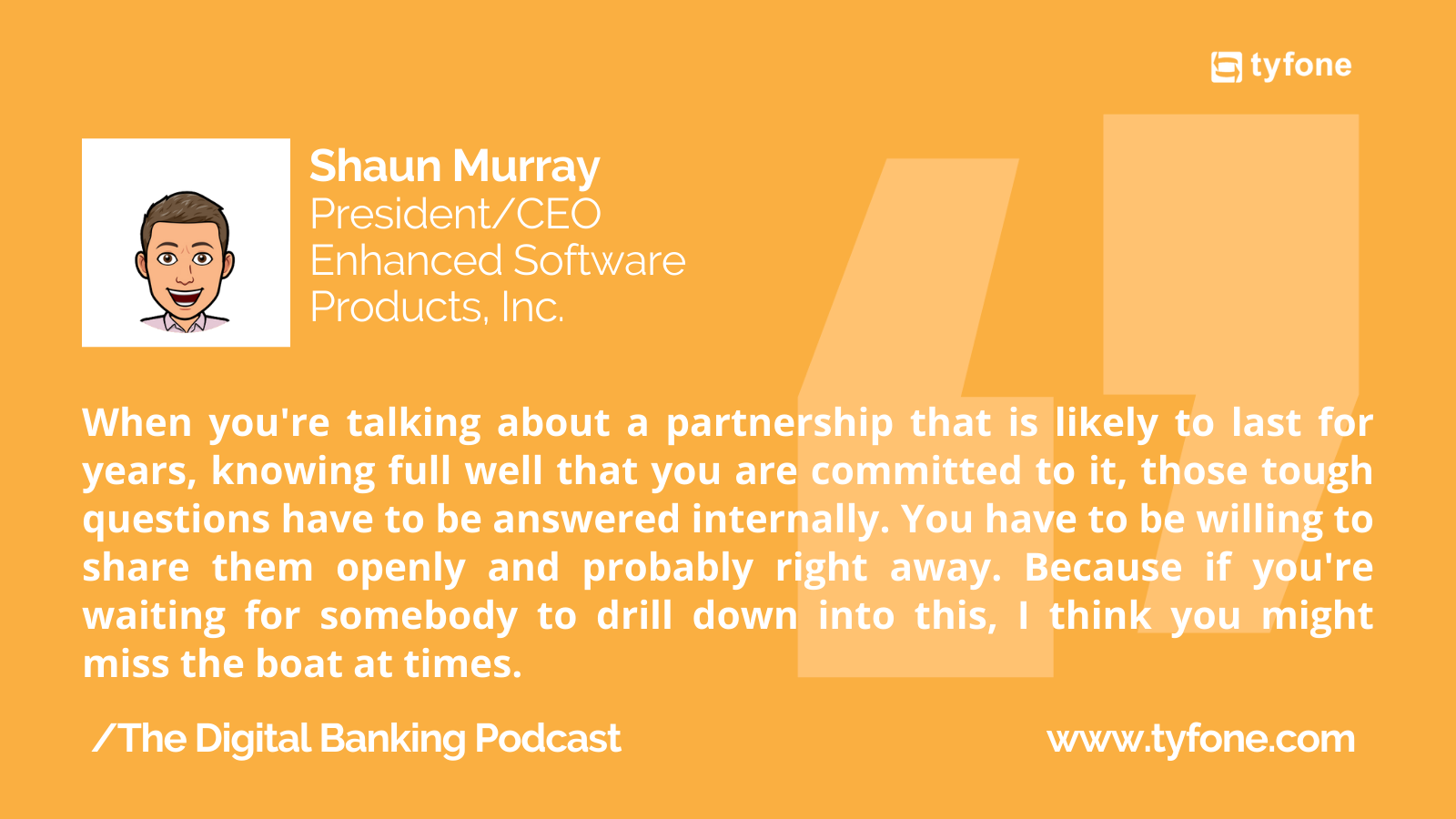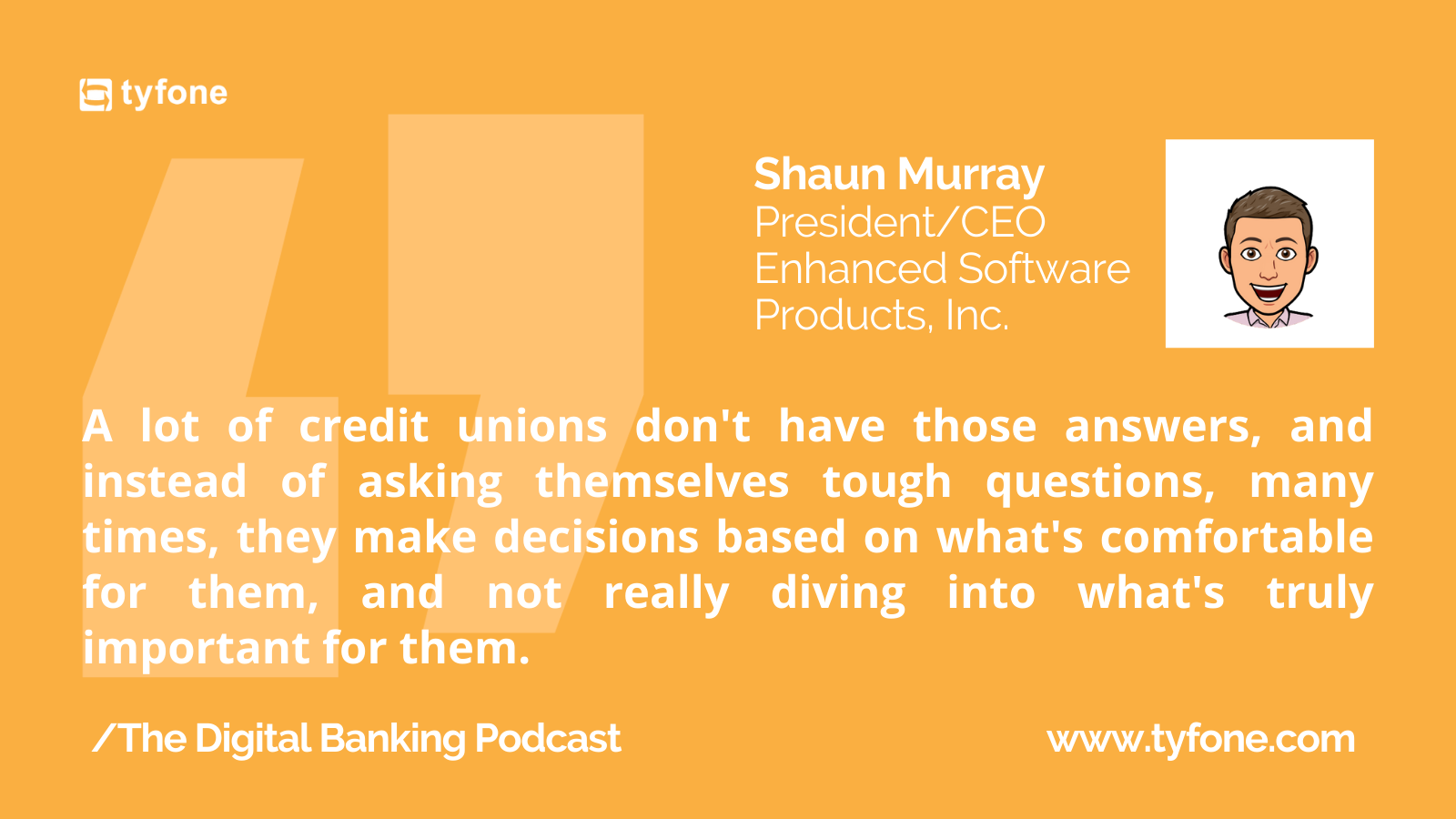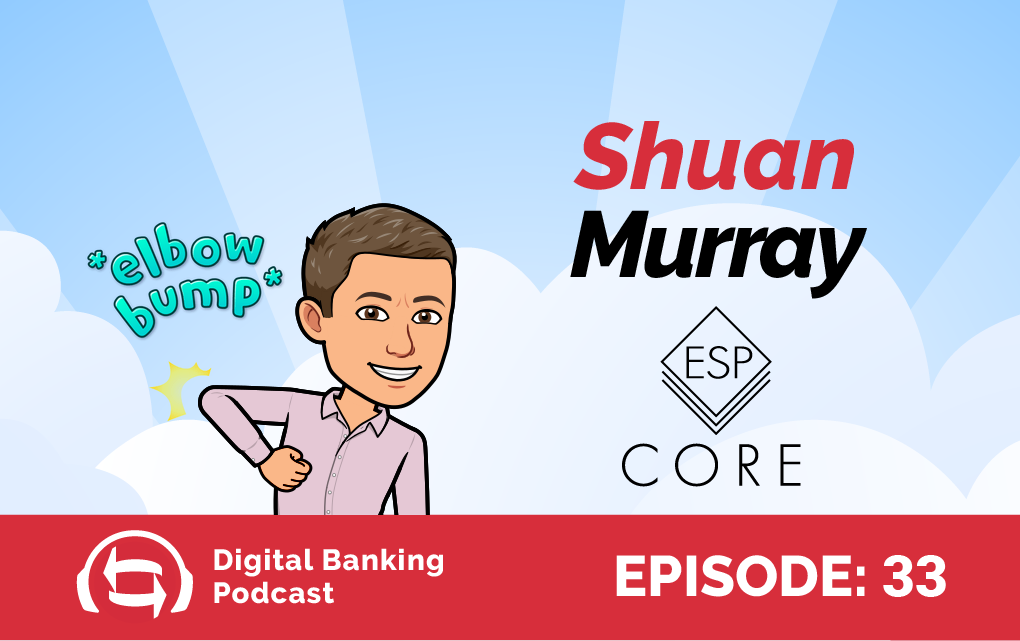How Due Diligence Leads to Long-Term Technology Partnerships, With Shaun Murray of Enhanced Software Products, Inc.
September 29, 2022
- Community FIs should rethink the way they are doing due diligence. Otherwise, they risk missing profitable opportunities, especially from a technological standpoint.
- Asking questions is the vital part of every due diligence process, whether talking to your employees, asking for referrals, or determining whether you and a potential vendor are on the same page.
- Don’t look at vendors as just service providers. Instead, aim to build long-term partnerships with them.
Staying relevant in the market and meeting consumer needs are the top priorities of every credit union. To fulfill that goal, community FIs need to be open to looking for and implementing solutions based on their need, want, and desire. However, finding the right technology provider may be tricky if credit unions don’t do due diligence properly.
In a recent episode of the Digital Banking Podcast guest Shaun Murray, the CEO at Enhanced Software Products (ESP), offered steps required for doing due diligence. He emphasized the importance of asking questions to determine whether you’re on the same page as your software vendor.
He also said asking for referrals is a part of the process no one should avoid, neither vendor nor credit unions. Furthermore, including your staff in the process ensures the most desired outcomes.
If you want to learn more about what Shaun and host Josh DeTar discussed, keep on reading or tune in to the new episode of the Digital Banking Podcast.

Do Due Diligence When Choosing a Technology Provider
When your business revolves around technology, you must be open to following and adapting to any change in the space. However, as our guest explained, not many community FIs, particularly credit unions, pay attention to what’s happening in the market and risk missing valuable opportunities, especially from a technological standpoint.
Also, the due diligence process is often seen as a partnership, but it seems like credit unions forget about that when the actual process starts.
”We run into a lot of credit unions these days, especially the smaller community FIs that are not really doing due diligence. They are sort of going along and not paying a lot of attention to what’s out there. We’ll call it complacency, for lack of better words,” said Murray.
“I think the due diligence process is not only important to see what’s out in the space, but also for the credit union to better understand what they’re looking for,” he continued. “Asking hard questions they might not have asked of themselves in the past, opening up their horizons to what’s available, and not being afraid.”

Recommendations Are Still One of the Best Marketing Tools
Murray encourages any community FI to ask for referrals when considering a new vendor. Credit unions and vendors need to accept that there’s nothing wrong with asking questions, especially turning to clients, former or existing, and asking about the collaboration they have had with a particular vendor.
“Call clients regardless of who you’re looking at … When you hire people, you call their previous employers. So why wouldn’t you do that now when you’re doing some very important partnerships?”
Asking Questions Is Critical When Doing Due Diligence
Murray believes involving as many people as possible in the process is of utmost importance for making the right decision. He cautioned credit unions not to overlook talking to peers who may have undertaken similar projects recently.
”If you have peers around you trust, I don’t care if they’re in your state, in a different sector in the credit union industry, but everyone has people they trust. [You] should be asking the questions, ‘Okay, I’m looking at whatever, a core, and what have you heard about X, Y, and Z? What do you think, do you know anybody using them?’”
You Want to Work With Like-Minded Vendors
You shouldn’t look at a vendor as just someone selling a product or a service. Instead, aim to build a partnership with them. That’s why a good cultural fit leads to a partnership that lasts long and is fruitful for both sides.
”There are solutions you can put in place that are quick and easy. They’re not what we do, but they’re quick and easy, and they can make decisions that have less thought in them because those can be changed if it doesn’t work. And nobody’s gonna lose their job or whatever the case may be,” said Murray.
“But when you’re talking about a partnership, that is for years,” he continued. Knowing full well that you are committed to that and hoping for a longer term, those questions have to be answered internally.
Community FIs Have a Purpose, So Let’s Help Them Fulfill It
Aside from asking for their employees’ opinions and looking for referrals, credit unions should also feel free to ask as many questions as they think are necessary while negotiating with the vendor. Murray believes every technology provider in a position to help a credit union should not hesitate to do so, even if their conversations don’t result in signing a contract. Small community FIs have a purpose, and software vendors can help them establish the best solution to fulfill it.
”Ask more questions you think you should and see if the responses are, in a sense, not right or wrong, but responsive,” suggested Murray. “What is that relationship like through the due diligence process? I think you could find a lot out in the relationship just by doing that. I’m on board. I’ll do a demo every day of the week, six times on Sunday. I’ll do it all. That’s what we do.”
“I want people to make the right decision, even if sometimes the right decision isn’t us,” he continued. “Credit unions that listen to this that have had us in their mix will know that I always support them after the fact with any Q&A to help them get through. I don’t want the small financial institutions, the middle size, the large ones; I don’t want those to go away. I want them to flourish because they have a purpose.”






